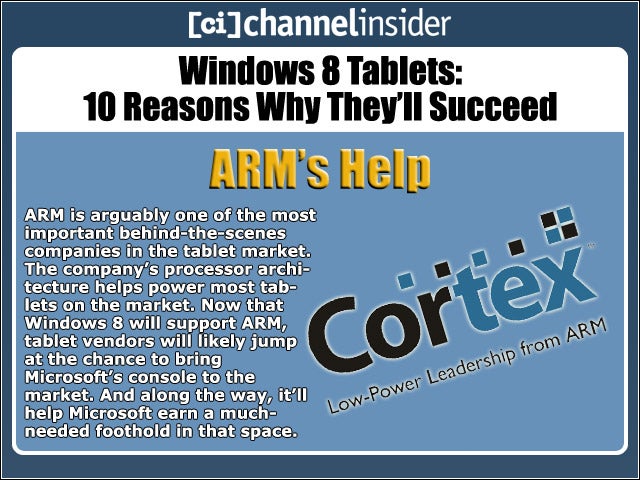 ARM’s Help
ARM’s Help
ARM is arguably one of the most important behind-the-scenes companies in the tablet market. The company’s processor architecture helps power most tablets on the market. Now that Windows 8 will support ARM, tablet vendors will likely jump at the chance to bring Microsoft’s console to the market. And along the way, it’ll help Microsoft earn a much-needed foothold in that space.
 Windows 8 Might Be A Winner
Windows 8 Might Be A Winner
By the look of things, Windows 8 looks to be a winner on several fronts. For one, it features a nice, Windows Phone 7-like interface that should appeal to consumers. Combine that with the security and usability improvements Microsoft is making, and it might just be more popular than Windows 7.
 Built-In Social Media
Built-In Social Media
Microsoft has said that social media will play a key role in Windows 8, which automatically makes it a winner in the tablet market. Like it or not, social media is huge. And users are accessing Twitter and Facebook from their devices. With the help of social media features built into Windows 8, it’ll be that much easier.
 The Apps Will Be There
The Apps Will Be There
Windows is a top choice among developers around the world because of its popularity. With Windows 8, that will likely be no different. Combine that with the fact that consumers and enterprise users expect apps to be on their tablets, and Microsoft shouldn’t have much trouble appealing to those who want ample app support.
 Windows Is Tablet-Ready
Windows Is Tablet-Ready
Microsoft has proven with Windows 8 that it realizes the future of computing is in tablets. And Windows 8 has been optimized to work with tablets, including featuring a virtual keyboard, touch-friendly icons, and much more. Windows is more tablet-ready than ever, and that should help Windows 8 tablets succeed.
 It’s More Consumer-Friendly
It’s More Consumer-Friendly
Though Windows has always been popular in the enterprise market, by the look of things, Windows 8 appears to be more consumer-friendly than previous versions. In the tablet space, that’s a good thing. Consumers are jumping at the chance to buy tablets, and they expect a friendly experience. Microsoft seems ready to offer that with Windows 8.
 Vendor Support Will Be There
Vendor Support Will Be There
Considering Windows 8 will be more tablet-friendly than any previous version of Windows since, Microsoft likely won’t have trouble attracting vendors. After all, the software giant is still the world’s top operating system provider. If vendors can capitalize on the popularity of Windows with their tablets, they will.
 Microsoft Is Ready to Spend Money
Microsoft Is Ready to Spend Money
Microsoft realizes that its tablet presence right now has been abysmal, and it understands that tablets are the future. The software giant is ready to invest in tablets to make its strategy work. And it’s important to remember that it has boatloads of cash it can dedicate to that plan. Microsoft’s deep pockets alone might make it relevant in the tablet market.
 It Has No Choice
It Has No Choice
Let’s face it: Microsoft has no choice but to be a success in the tablet market. Analysts say as many as 50 million tablets will hit store shelves this year alone. If Microsoft doesn’t attempt to dominate that space, it could be cornered out of the key market that will come to define the tech industry in the coming years.
 Strength In Numbers
Strength In Numbers
One thing that Microsoft has going for it as it prepares to take on Apple is its strategy. Rather than offer a single device to take on Apple, Microsoft is delivering the software that other vendors will use. So, the company will have several devices on store shelves ready to take on Apple’s iPad 2. Google is doing the same with Android.

